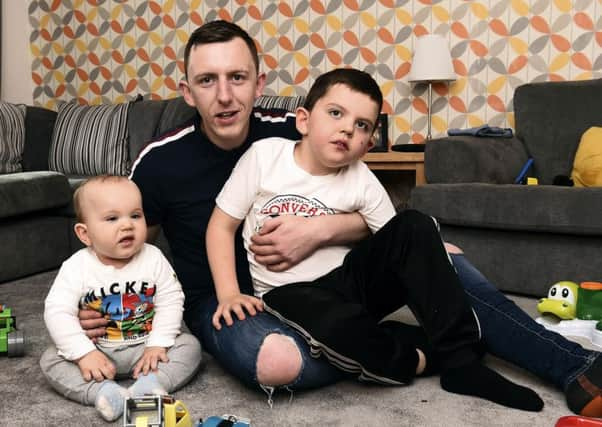Scottish dad’s anger that ‘some fathers are ashamed of children with autism’


Burns, 27, a former welder, says his Father’s Day wish is for the Scottish Government to set up a Scottish Autism Centre for information and respite.
Burns, from Livingston, West Lothian, took radical action himself by signing up for an HNC and then an HND in Childhood Practice at West Lothian College while struggling to cope with the lack of information after Luke, now seven, was diagnosed.
Advertisement
Hide AdAdvertisement
Hide Ad“I’ve spoken to other parents, especially dads who don’t want to go out in public with their children because they don’t understand autism and don’t know how to act,” Burns said.
“I’ve managed to get a lot more knowledge, but me and my partner, Jade Lee Smith, were really struggling at first.
“We were very lucky to get an early diagnosis for Luke not long after he was one-and-a-half years old. Then everything stopped. The help now is very good but we should have got it earlier.
“I think a lot of men bury their head in the sand. There’s a lot of pressure and not enough jobs to help support your family. ”
Advertisement
Hide AdAdvertisement
Hide AdBurns, who will be starting an online course in Child and Youth studies with the University of the Highlands and Islands in September with the aim of becoming a social worker, says whilst he and Jade and their other son, Ollie, one, have great fun with Luke, it is exhausting work.
“He is a big boy and we have to push him in a pram because he has no sense of danger and would run out in front of a car,” says Burns.
“But the joy for us is seeing him develop as his own person. He has such love within him and we can see the child in him. Doing the college courses was the only way I could think of to get some answers. The staff are great and have calmed me down and given me a ‘template’ and so much information about things like development stages, so that me and Jade are far more confident now.”
Kirsty Nicholls, head of marketing and digital content at Fathers Network Scotland, said fathers could be left feeling “powerless and isolated” when some agencies tend to regard the mother as the main carer.
Advertisement
Hide AdAdvertisement
Hide Ad“Most dads want to be involved as much as possible in their children’s lives and there often seems to be an assumption that this isn’t the case. This is a brilliant example of a dad who is doing his utmost to care for his son and we are meeting more and more dads who are educating themselves about health and child care.
“During our East Lothian Father-Friendly Schools project, we found that 38 per cent of dads felt their school valued their views
“Stereotypical gender roles – mums are the main care-givers and dads are the providers – are really damaging. As well as being a barrier to women both at home and in the workplace, it means men often feel powerless and isolated when it comes to their role as a parent. Men are often expected to ‘man up’ and not discuss their feelings or role as a care-giver.”
The Scottish Government’s Carers (Scotland) Act, which came into effect on 1 April, 2018, means carers can get information on local and national break options through the new short breaks services statement that must be published by local authorities.
Advertisement
Hide AdAdvertisement
Hide AdA Scottish Government spokesman said: “The Scottish Government is committed to improving the lives of autistic people through our Scottish Strategy for Autism, which focuses on outcomes ensuring autistic people live healthier lives, enjoy choice and control over the services they use, and are supported to be independent and active citizens.
“The Carers Act requires local authorities to consider whether support to a carer should take the form of, or include, a break from caring. This support extends to short breaks and replacement care in the form of respite for the cared-for person to enable the carer to take a short break.”